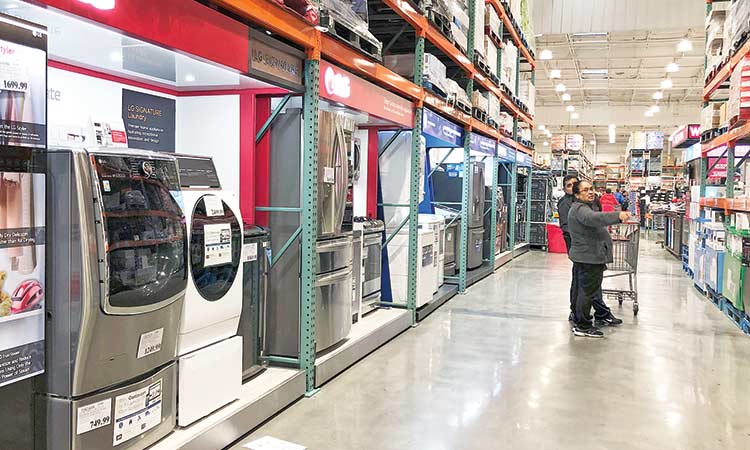New orders for US-made capital goods drop most in eight months

Customers at an outlet of home appliances in New Rochelle, US. Associated Press
Business spending has remained weak even as the Federal Reserve cut interest rate cuts three times last year. Officials from the US central bank held a two-day policy meeting.
For now, however, the longest economic expansion on record looks set to continue, with other data showing consumer confidence surged to a five-month high in January amid optimism over the labour market. That suggests consumer spending could stay fairly strong in the near term and blunt some of the hit on the economy from weak business investment.
Weak business investment and the resulting slump in manufacturing have been on the radar of Fed officials who have blamed trade tensions, especially the White House’s 18-month trade war with China, and an uncertain global economic growth outlook for the malaise.
Though tensions have eased with the signing this month of a “Phase 1” trade deal between Washington and Beijing, Boeing continues to loom over manufacturing. Boeing this month suspended production of its troubled 737 MAX jetliner, which was grounded last March following two fatal crashes.
“Manufacturing is clearly losing momentum as many of the most extreme tariffs on supply-chain inputs factories need to produce their final goods remain in place,” said Chris Rupkey chief economist at MUFG in New York. “When it comes to forecasting the economy in 2020, it’s the consumer stupid.”
The Commerce Department said orders for non-defense capital goods excluding aircraft, a closely watched proxy for business spending plans, fell 0.9% last month as demand for machinery, primary metals and electrical equipment, appliances and components declined. That was the largest decrease since April.
Data for November was revised lower to show these so-called core capital goods orders edging up 0.1% instead of gaining 0.2% as previously reported. Economists polled by Reuters had forecast core capital goods would be unchanged in December.
Core capital goods orders rose 0.8% in 2019. Shipments of core capital goods decreased 0.4% last month. Core capital goods shipments are used to calculate equipment spending in the government’s gross domestic product measurement. They declined by an unrevised 0.3% in November.
business investment has contracted for two straight quarters and was likely stuck in the red in the fourth quarter. The latest data also suggest a recovery is unlikely soon.
The Atlanta Fed is forecasting GDP to rise at a 1.9% annualized rate in the fourth quarter. The economy grew at a 2.1% rate in the July-September period. The government will publish its snapshot of fourth-quarter GDP on Thursday.
In a separate report on Tuesday, the Conference Board said its consumer confidence index increased 3.4 points to a reading of 131.6 in January, the highest reading since August. Economists expected a temporary drop in consumer confidence in February because of the deadly coronavirus, which has killed more than 100 people in China, with cases reported in some countries including the United States, France and Japan.
The survey’s so-called labor market differential, derived from data on respondents’ views on whether jobs are plentiful or hard to get, increased to 37.4 this month from 33.5 in December.
That measure closely correlates to the unemployment rate in the Labor Department’s employment report. Though the labour market remains strong, there are signs that momentum is slowing. Job growth cooled in December and vacancies recorded their biggest drop in more than four years in November.
“The good news is that a drop in confidence is unlikely by itself to cause a significant drop in consumer spending,” said Ryan Sweet, a senior economist at Moody’s Analytics in West Chester, Pennsylvania.
Reuters



